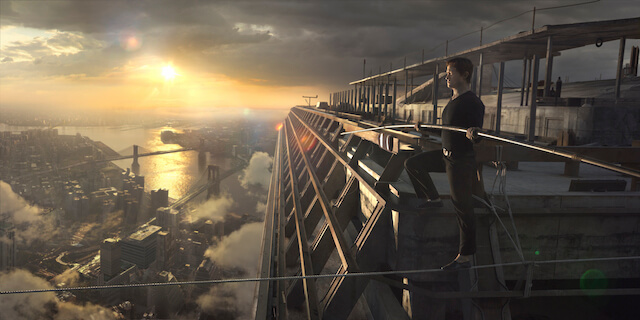‘The Walk’ There’s a solid reason for “The Walk” to exist and, of course, it’s the walk itself. The story in Robert Zemeckis’ latest was already told, and semi-recently at that, in “Man on Wire,” which too chronicled French acrobat Philippe Petit’s storied and stranger-than-fiction tight-rope stroll between the Twin Towers in 1974. But footage of Petit’s saunter is virtually non-existent, and “Man on Wire” was forced to resort to insistent music and hyperbolic talking heads to conjure up a spell. “The Walk,” meanwhile, has 3-D, IMAX and one of cinema’s most tech-friendly maximalists at the helm. RELATED: “The Martian” is a rare feel-good Ridley Scott movie (about potential death) The big centerpiece (at the end, as it were) is not a let-down. Zemeckis creates both a sense of vertigo — staring down 110 stories is something else on a big screen, with an extra dimension turning the depth of field into a visceral wow — and a sense of peace, transcendence. Petit (played with appropriate excitability by Joseph Gordon-Levitt) doesn’t just walk it once; he stays up there, he struts back and forth, and just when you think he’s done he tosses his balance beam over his shoulders and flips around for another go. He lays on the ¾-inch beam to stare at the heavens and kneels down to offer emphatic adulation to the wire, to his admiring (and in the case of police, hopping mad and admiring) audience, to the city itself, and, tacitly, unintentionally, to the structures that no longer stand. It would be easy to say this capper is all “The Walk” has going for it, but for the record it’s all of a piece, and one doesn’t fully get the payoff without the build-up. There is, certainly, a lot of overlap with “Man on Wire,” and not just in the story. Both films depict the invasion and essential conquering of the World Trade Center — by a Frenchman, a retroactive joke neither films feel compelled to underline and italicize — as a peppy heist saga, this one with “Mission: Impossible”-y music. Both adopt the bouncy tone of its hero. “The Walk” even begins with Gordon-Levitt chirping into the camera from atop a CGI Statue of Liberty overseeing a CGI ’70s NYC, not unlike the way Petit himself played incorrigible talking head in “Man on Wire.” Gordon-Levitt, no matter how hyperactive and how many times he says “zee” instead of “the,” can’t come close to the real deal, and the script doesn’t give him too many chances to show off his stuff. Still, Zemeckis makes the story his own, which is to say he turns it into one of his proudly cornball triumphs of the eccentric spirit. It’s a storybook film in tone and in look: artificial, broad, decked out in effects both obvious and subtle. Every setting, from a dreamy Paris to an all-too-real WTC, plus the old NYC skyline, are fake, and fake-looking — a fitting otherworld for a larger-than-life nut like Petit. The backstory is boilerplate, which is not the same as lazy. Petit is a dreamer with the usual humble beginnings who experiences the usual carousel of setbacks and mini-triumphs on the road to his big score. Sometimes Zemeckis trods through this story type sleepily, stretching out a lithe tale to its near-breaking point. A minor character — a crusty mentor played by Ben Kingsley — could have been snipped without anyone noticing, and some of the more risque touches (Petit parlaying his big success into bedding a stranger) have been elided for the PG-rating. RELATED: “Everest” favors chilling intimacy over Instagrammable sights But it mostly keeps it simple to match Petit’s plan, which is both elementary and absurd. Even he can’t explain why he wants to traverse the Twin Towers. He also has no way of foreseeing the inadvertent meaning of someone doing something magical, death-defying and ineffably beautiful between two ostentatious landmarks whose destruction will mark a key turning point in modern American history. “The Walk” does understand it, and for the most part underplays it. There’s a line at the end where Petit’s ladyfriend and co-conspirator (Charlotte Le Bon) tells him he’s “brought them to life, gave them a soul,” followed by the city darkening except for the two buildings. But that’s as on-the-nose as “The Walk” gets, and it still registers as tasteful, not crude. Zemeckis is one of digital cinema’s best friends, and he knows that all movies are an optical illusion. He’s using tech to and the language of populist film to bring the World Trade Center back to life, turning them into real objects that are nonetheless trapped in the screen. When Petit first encounters them in person, he touches the side with his nose, as though using his head to create a mind-meld; all we, as voyeurs, can do is look. But Zemeckis is also recreating the walk itself — another ephemeral thing that once lived only in pictures and rapturous accounts, that couldn’t even fully and powerfully come back in a doc as loved and award-gobbling as was “Man on Wire.” “The Walk” is at once thin and mighty — redundant in some ways yet quietly, even tragically bittersweet. Follow Matt Prigge on Twitter @mattprigge
Director: Robert Zemeckis
Stars: Joseph Gordon-Levitt, Charlotte Le Bon
Rating: PG
3 (out of 5) Globes
‘The Walk,’ another Philippe Petit film, is both redundant and transcendent

Sony


















